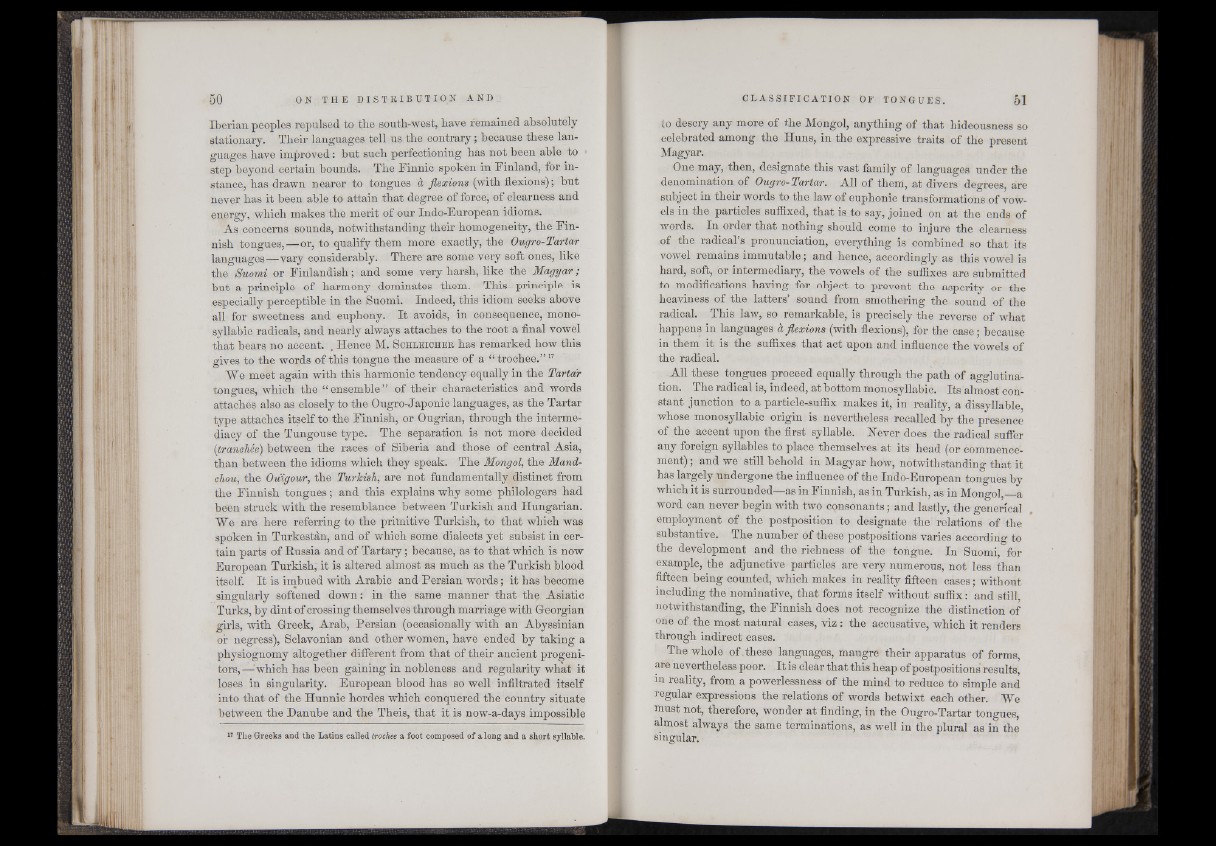
Iberian peoples repulsed to the south-west, have remained absolutely
stationary. Their languages tell us the contrary ; because these languages
have improved : but such perfectioning has not been able to ■
step beyond certain bounds. The Finnic spoken in Finland, for instance,
has drawn nearer to tongues à flexions (with flexions) ; hut
never has it been able to attain that degree of force, of clearness and
energy, which makes the merit of our Indo-European idioms.
As concerns sounds, notwithstanding their homogeneity, the Finnish
tongues,—or, to qualify them more exactly, the Ougro-Tartar
languages—vary considerably. There are some very soft ones, like
the Suomi or Finlandish ; and some very harsh, like the Magyar;
but a principle of harmony dominates them. This- principle is
especially perceptible in the Suomi. Indeed, this idiom seeks above
all for sweetness and euphony. It avoids, in consequence, monosyllabic
radicals, and nearly always attaches to the root a final vowel
that bears no accent. , Hence M. S c h l e i c h e r has remarked how this
gives to the words of this tongue the measure of a “ trochee.” 17
We meet again with this harmonic tendency equally in the Tartar
tongues, which the “ ensemble” of their characteristics and words
attaches also as closely to the Ougro-Japonic languages, as the Tartar
type attaches itself to the Finnish, or Ougrian, through the intermediacy
of the Tungouse type. The separation is not more decided
(tranchée) between the races of Siberia and those of central Asia,
than between the idioms which they speak. The Mongol, the Mandchou,
the Ouigour, the Turkish, are not fundamentally distinct from
the Finnish tongues ; and this explains why some phllologers had
been struck with the resemblance between Turkish and Hungarian.
We are here referring to the pritnitiv-e Turkish, to that which was
spoken in Turkestan, and of which some dialects yet subsist in certain
parts of Russia and of Tartary ; because, as to that which is now
European Turkish,' it is altered almost as much as the Turkish blood
itself. It is imbued with Arabic and Persian words ; it has become
singularly softened down : in the same manner that the Asiatic
Turks, by dint of crossing themselves through marriage with Georgian
girls, with Greek, Arab, Persian (occasionally with an Abyssinian
or negress), Sclavonian and other women, have ended by taking a
physiognomy altogether different from that of their ancient progenitors,—‘
which has been gaining in nobleness and regularity what it
loses in singularity. European blood has so well infiltrated itself
into that of the Hunnic hordes which conquered the country situate
between the Danube and the Theis, that it is now-a-days impossible
17 The Greeks and the Latins called trochee a foot composed of a long and a short syllable.
to descry any more of the Mongol, anything of that hideousness so
celebrated among the Huns, in the expressive traits of the present
Magyar.
One may, then, designate this vast family of languages under the
denomination of Ougro-Tartar. All of them, at divers degrees, are
subject in their words to the law of euphonic transformations of vowels
in the particles suffixed, that is to say, joined on at the ends of
words. In order that nothing should come to injure the clearness
of the radical’s pronunciation, everything is combined so that its
vowel remains immutable ; and hence, accordingly as this vowel is
hard, soft, or intermediary, the vowels of the suffixes are submitted
to modifications having for object to prevent the asperity or the
heaviness of the latters’ sound from smothering the sound of the
radical. This law, so remarkable, is precisely the reverse of what
happens in languages à flexions (with flexions), for the case; because
in them it is the suffixes that act upon and influence the vowels of
the radical.
All these tongues proceed equally through the path of agglutination.
The radical is, indeed, at bottom monosyllabic. Its almost constant
junction to a particle-suffix makes it, in reality, a dissyllable
whose monosyllabic origin is nevertheless recalled by the presence
of the accent upon the first syllable. Never does the radical suffer
any foreign syllables to place themselves at its head (or commencement)
; and we still behold in Magyar how, notwithstanding that it
has largely undergone the influence of the Indo-European tongues by
which it is surrounded—as in Finnish, as in Turkish, as in Mongol, a
word can never begin with two consonants ; and lastly, the generical
employment of the postposition to designate the relations of the
substantive. The number of these postpositions varies according to
the development and the richness of the tongue. In Suomi, for
example, the adjunctive particles are very numerous, not less than
fifteen being counted, which makes in realify fifteen cases ; without
including the nominative, that forms itself without suffix : and still,
notwithstanding, the Finnish does not recognize the distinction of
one of the most natural cases, viz : the accusative, which it renders
through indirect cases.
The whole of .these languages, maugre their apparatus of forms,
are nevertheless poor. It is clear that this heap of postpositions results,
in reality, from a powerlessness of the mind to reduce to simple and
regular expressions the relations of words betwixt each other. We
must not, therefore, wonder at finding, in the Ougro-Tartar tongues,
almost always the same terminations, as well in the plural as in the
singular.